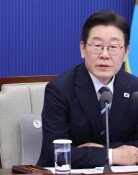Weak pledges on N.Korea policy
Weak pledges on N.Korea policy
Posted December. 05, 2012 01:10,
The next president, who will be inaugurated in February next year, will face a tumultuous diplomatic and national security environment. The Asia-Pacific region is the most directly impacted by changes led by the U.S. and China. America is being led by President Barack Obama in his second term and China by its new leader Xi Jinping. Another challenge could come from growing right-wing sentiment in Japan, a country set to face a change in administration three days ahead of South Koreas Dec. 19 presidential election. The next leader of South Korea must tackle North Koreas planned launch of a long-range missile immediately after election regardless of whether the launch is successful or not.
Park Geun-hye, the presidential candidate of the ruling Saenuri Party, and her rival Moon Jae-in of the main opposition Democratic United Party on Tuesday held their first TV debate. They spoke of diplomatic, security and reunification pledges. Voters must make the right choice by carefully comparing their policies. The country`s future depends on a leader who can increase South Koreas global presence through competitive diplomacy over national interests, not to mention tame domestic politics. The people need to think carefully about who can effectively tackle pending issues with a future vision and solutions.
Park and Moon expressed significant differences in North Korea policy. Park proposed to seek trust diplomacy on the Korean Peninsula through the setup of inter-Korean cooperative offices in Seoul and Pyongyang. Yet she called North Korea`s provocations, namely the 2010 sinking of the South Korean naval corvette Cheonan, the shelling of Yeonpyeong Island the same year, and the 2008 killing of a South Korean tourist in Mount Kumgang, and demanded from Pyongyang an apology and a pledge of no recurrence. Moon, on the other hand, pledged to lift sanctions on the Stalinist state, which were imposed by South Korea shortly after the Cheonan sinking. He also said he will invite North Korea`s leader to his inauguration if elected and hold another inter-Korean summit in his first year in office.
Since the two candidates have different opinions on the cause of strained inter-Korean relations, they naturally have different solutions. Park blamed the North`s provocations for souring ties, while Moon blasted the "hawkish" policy of the incumbent Lee Myung-bak administration in Seoul. As these two opinions cannot coexist, voters will make the decision.
The two candidates also announced grandiose plans for inter-Korean ties. Park pledged an economic community on the Korean Peninsula, while Moon talked of an inter-Korean economic alliance. Even if the North agrees to dialogue with the South, the plan will never see the light of day within a five-year presidential term. Both runners are trying to woo voters with pledges that are improbable. North Korean leader Kim Jong Un is preparing to launch a long-range missile. A notice on the launch plan means Pyongyang has no willingness to talk with Seoul or Washington. If the Stalinist country pushes for the launch, the next administration in South Korea has to deal with the former through sanctions imposed by the United Nations. Both candidates must acknowledge the North`s threat of provocation as a constant and devise policies that can achieve a breakthrough.



![연금 개시 가능해지면 年 1만 원은 꼭 인출하세요[은퇴 레시피]](https://dimg.donga.com/c/138/175/90/1/wps/NEWS/IMAGE/2026/02/20/133390850.4.jpg)



